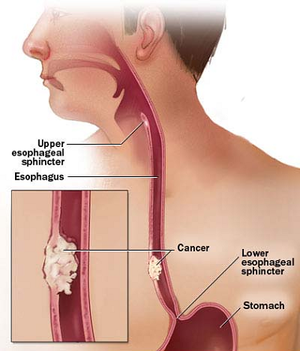Difference between revisions of "Esophageal Cancer"
From Wikiwel
(→Home remedies) |
(→Home remedies) |
||
| Line 17: | Line 17: | ||
* [[Sulfur]] : In laboratory animals, consumption of garlic and related sulfur compounds reduced carcinogen-induced mammary, colon, esophageal, lung, stomach, skin and liver tumors. | * [[Sulfur]] : In laboratory animals, consumption of garlic and related sulfur compounds reduced carcinogen-induced mammary, colon, esophageal, lung, stomach, skin and liver tumors. | ||
* [[Coriolus]] : PSK has been used in Japan for several decades for breast cancer, esophageal cancer, gastric cancer, lung cancer, hepatic cancer, colorectal cancer, and nasopharyngeal cancer. | * [[Coriolus]] : PSK has been used in Japan for several decades for breast cancer, esophageal cancer, gastric cancer, lung cancer, hepatic cancer, colorectal cancer, and nasopharyngeal cancer. | ||
| + | * [[Wild Tomatillo]] : So far, the researchers have demonstrated 14 compounds found in the plant can fight numerous cancers and tumors without any apparent side effects or toxicity—namely: melanomas, thyroid cancer, head and neck squamous cell cancer, breast cancer, glioblastoma brain tumors, and certain leukemias. | ||
== Warnings == | == Warnings == | ||
Revision as of 12:32, 29 February 2016
See also : Throat Cancer
Throat Cancer and Esophageal Cancer aren't "exactly" the same thing, but are usually linked together because throat cancer can lead to esophageal cancer if not treated immediately.
Symptoms
Home remedies
- The natural polyphenol in Green Tea known as ECGC has been shown to be particularly effective in lowering risk of a host of cancer cell lines including prostate, colon, esophagus, bladder and pancreas.
- Strawberries may prevent esophageal cancer.
- Apples : An apple-derived procyanidin has been found to suppress esophageal cancer
- Onion consumption has been shown to help lower the risk of prostate and esophageal cancers.
- Watercress : The phytochemicals in watercress battle cancer in three ways: killing cancer cells, blocking carcinogens, and protecting healthy cells from carcinogens. They’ve also been shown to help prevent lung and esophageal cancer and can help lower your risk for other cancers.
- Apple cider vinegar : One study found that eating vinegar was associated with a decreased risk of esophageal cancer.
- Folic Acid : A lack of folic acid in the diet has been linked to increased incidence of a number of cancers, including colon, cervix, rectum, lung, brain, pancreas and esophageal cancers, according to the Linus Pauling Institute at Oregon State University.
- Apples : An apple-derived procyanidin has been found to suppress esophageal cancer.
- Jiaogulan has shown activity against esophageal, breast, uterus, prostate, brain, kidney, thymus and skin cancer.
- Acai berries health benefits also include an ability to inhibit tumor progression in esophageal cancer.
- Sulfur : In laboratory animals, consumption of garlic and related sulfur compounds reduced carcinogen-induced mammary, colon, esophageal, lung, stomach, skin and liver tumors.
- Coriolus : PSK has been used in Japan for several decades for breast cancer, esophageal cancer, gastric cancer, lung cancer, hepatic cancer, colorectal cancer, and nasopharyngeal cancer.
- Wild Tomatillo : So far, the researchers have demonstrated 14 compounds found in the plant can fight numerous cancers and tumors without any apparent side effects or toxicity—namely: melanomas, thyroid cancer, head and neck squamous cell cancer, breast cancer, glioblastoma brain tumors, and certain leukemias.
Warnings
References
Medical Disclaimer
This information is not meant to be substituted for medical advice. Always consult a medical professional regarding any medical problems and before undertaking any treatment or dietary changes.
